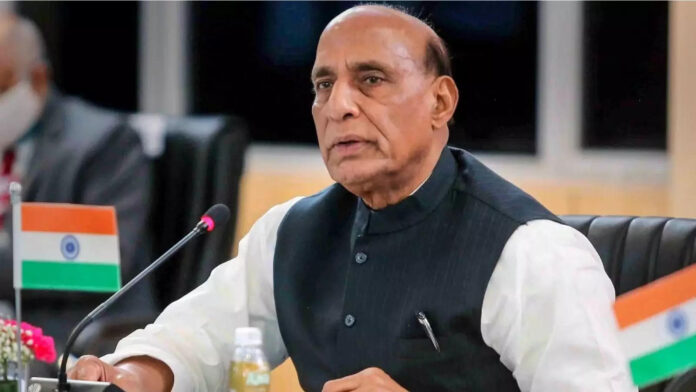Rajnath Singh’s open invitation to PoK residents has made headlines across the world. In a recent address, India’s Defense Minister emphasized the country’s unwavering position on Jammu and Kashmir. He strongly asserted that Article 370, which granted special status to Jammu and Kashmir, will never be reinstated. This statement was made during a public event in Jammu and Kashmir, highlighting India’s firm stance on the matter.
Article 370: A Brief Overview
Article 370 was introduced in 1949 to provide special status to Jammu and Kashmir, giving the region autonomy in all areas except foreign affairs, defense, and communications. However, in August 2019, the Indian government, led by Prime Minister Narendra Modi, revoked this provision. This decision aimed to fully integrate Jammu and Kashmir with the rest of India, promoting development, peace, and security in the region.
The Supreme Court of India upheld this move, clarifying that Article 370 was always a temporary provision in the Constitution. A five-judge bench ruled that the special status was meant to facilitate Jammu and Kashmir’s merger with India, but it was never intended to be permanent. Rajnath Singh’s open invitation to PoK residents comes on the heels of this monumental decision.

Pakistan’s Treatment of PoK Residents
In his address, Rajnath Singh pointed out that Pakistan treats Pakistan-occupied Kashmir (PoK) residents unfairly, often refusing to recognize them as citizens. In contrast, India considers PoK residents as its own. Singh reiterated that India’s doors have always been open to PoK residents, inviting them to be part of India’s democratic system.
According to Singh, Pakistan’s governance in PoK is marred by political instability and economic hardships, which stand in stark contrast to India’s development efforts in Jammu and Kashmir. This has led to widespread discontent among PoK residents.
India’s Development Efforts in Jammu and Kashmir
India’s post-abrogation of Article 370 efforts have focused on improving the infrastructure and quality of life in Jammu and Kashmir. The government has rolled out several development projects, including new highways, hospitals, schools, and tourism initiatives. These projects aim to boost the economy and win the hearts and minds of the local population.
Rajnath Singh believes that as India’s development agenda progresses, PoK residents will see the benefits of being part of a stable and growing democracy. His prediction that they will opt to join India reflects a broader vision for resolving the territorial dispute with Pakistan.
Rajnath Singh’s Firm Stand on Article 370
Rajnath Singh’s open invitation to PoK residents is not just about the future of the region but also a reaffirmation of India’s stand on Article 370. Singh made it clear that no political or external force could restore the provision. This statement comes amid growing demands from certain political groups and separatists for its reinstatement.
However, Singh argued that such demands are futile, as the abrogation of Article 370 was necessary for the unification of Jammu and Kashmir with the rest of India. He emphasized that the region is an integral part of the country, including PoK.
Tensions with Pakistan Escalate
Rajnath Singh’s open invitation to PoK residents has undoubtedly increased tensions with Pakistan. Islamabad considers PoK part of its territory and has repeatedly raised the issue at international forums, including the United Nations. However, the global community largely views the abrogation of Article 370 as an internal matter for India.
While Pakistan has called India’s move illegal, it has failed to garner widespread international support for its claims. Rajnath Singh’s statement that PoK residents may choose to align with India in the future adds another layer of complexity to the already strained relationship between the two nations.
The Global Perspective on Article 370 and PoK
Since the abrogation of Article 370, there has been considerable international attention on Jammu and Kashmir. While some countries have expressed concerns about human rights in the region, most view the decision as an internal matter for India. Rajnath Singh’s open invitation to PoK residents signals India’s intent to integrate not just Jammu and Kashmir but also PoK into its democratic framework.
The abrogation has paved the way for economic development, social integration, and better governance in Jammu and Kashmir. Proponents of the move argue that it has opened doors for new opportunities, including investments and improved public services. This development model contrasts sharply with the conditions in PoK, where residents face ongoing political instability and economic difficulties.
PoK’s Future: Joining India?
Rajnath Singh’s open invitation to PoK residents carries a significant message. His statement that the residents of PoK may one day choose to join India reflects confidence in India’s development approach. PoK, also known as Azad Kashmir, has been under Pakistan’s control since the First Indo-Pakistani War in 1947-48. However, with India’s growing presence and development efforts in Jammu and Kashmir, Singh believes that the residents of PoK will recognize the benefits of becoming part of India.
This future scenario hinges on India’s ability to maintain stability and continue its development agenda in Jammu and Kashmir. As the region continues to grow, the possibility of PoK residents opting to join India could become more plausible.
Conclusion
Rajnath Singh’s open invitation to PoK residents has sent shockwaves through both domestic and international circles. His firm stand on Article 370 and his belief that PoK residents will eventually choose India highlights India’s vision for the future of Jammu and Kashmir. As the region continues to develop, the contrast between the governance of India and Pakistan will likely become even more evident. The ongoing efforts to improve infrastructure, promote tourism, and boost security in Jammu and Kashmir serve as a blueprint for the future of the region and could eventually lead to the unification of PoK with India.


[…] Share FacebookTwitterPinterestWhatsApp Previous articleRajnath Singh’s Open Invitation to PoK Residents to Live in India .tdi_71 .td-image-wrap{padding-bottom:70%}.tdi_71 .entry-thumb{background-position:center […]